- Home
- Bianca Blythe
The Earl's Christmas Consultant Page 5
The Earl's Christmas Consultant Read online
Page 5
The Duke of Vernon had a piano in his townhome, but music was never a passion of his and the piano sat against the wall. This was a grand piano. A Broadwood.
“The Greta I knew played the piano sweetly.”
“I didn’t know you listened to me.”
He flushed. “There should be some sheet music here.” He opened a box and placed something before her.
“Are you testing my ability to read music?”
“I just want to know you can play.” He gave a wry smile. “Most servants wouldn’t know how to.”
She hesitated. “Then I will play my own piece.”
His eyes widened.
Perhaps she’d confessed too much. No one knew she composed her own music. But when would she have another chance to play music on such a lovely piano?
“Very well,” he said.
“I haven’t played in a while,” she warned him.
“If you play at all you will be special.”
She nodded and glanced at the piano. The black and white keys were enticing, and the rest of it was all sleek wooden curves. “Let me fetch my music.”
“Hurry.”
She rushed up the steps to the room the housekeeper had allotted for her. Most likely she would have to leave it soon. Even if the earl believed her, that didn’t mean he desired her to stay. She grabbed her compositions, hurried down the steps and slid onto the piano seat. The keys glistened temptingly before her.
Her body shook, but something in her heart still sang. She was going to play the piano.
“Go ahead.”
“N-naturally.” Flora was jolted from her musings. “It’s just so beautiful.”
The earl raised his eyebrows, and she inhaled.
And in the next moment she was playing. She played the melody she’d composed during her trip, when she’d had emotions whirling through her. And then she played other melodies, composed at the vicarage, at the Butterworth’s London town home and finally in the capital. She concentrated on the sounds of the keys, losing herself in the music. For a moment she could pretend this was her piano, and that everything in the world was wonderful.
She didn’t want to glance at the earl. She didn’t want to see his expression. Would he believe her? Would he still despise her even if he did?
All that mattered now was the piano and her music.
Finally, she stopped.
WOLFE HADN’T EXPECTED to enjoy the music. The music had been a test. One he was feeling rapidly guilty about.
Some women excelled at music. Music, like watercolors or sewing, was a feminine pursuit, and this woman did it with aplomb.
Maids though to let them practice. Music was something one needed to be taught, and in Wolfe’s experience, masters did not go about giving lessons to maids. This woman seemed to have been taught. Her fingers had flown over the keys. She’d given each note the correct weight, the correct length.
“You’re Herr Braun’s daughter,” Wolfe said.
She nodded.
“I should have believed you. I’m sorry. I just didn’t—”
“—expect me,” she finished. “I know.”
He nodded. “I think I have to take a seat.”
She gave a wobbly smile.
“You needn’t play more,” he said. “Though that was...beautiful.”
“Thank you.”
“Your father was the finest tutor I ever had. Had it not been for him...” He shook his head. “I’m happy to have met you. How is your father?”
She stiffened. “He’s dead.”
His heart squeezed.
Before Herr Braun had shown any interest in him, Wolfe had been called hopeless. Isla was younger than Wolfe, but she’d learned to read far more quickly, as had Callum and Hamish. He’d been conscious of attempting to learn, but whatever techniques for learning had worked so easily with Isla, never worked with him.
His tutors had berated him with unrelenting frequentness, scolding him. His mother had looked at him with disappointment, and his father had not veiled any of his horror at the inability of Wolfe to do something they all deemed simple.
But reading? Reading had seemed impossible.
Isla had been able to spend hours turning pages of books, speaking of castles and princesses, dragons and sea voyages, with glee, but for him it had just been paper with black squiggles on it until the music teacher had arrived.
Obviously he’d not come to visit Wolfe. Wolfe had needed to focus on his lessons after all. Even though the piano was respected, it was not respected over reading or doing arithmetic.
But Herr Braun had been able to make the most glorious sounds from the piano that sat untouched in the parlor, and after he’d left, Wolfe had gathered up his courage to sit on the piano bench and play the keys himself. He’d only needed to observe the piano tutor. That had been all to repeat the rhythm that he’d played.
On some occasions Wolfe wondered what might have happened to him if the piano tutor had never noticed Wolfe playing and had never taken it upon himself to teach Wolfe. The man had been the very first one to offer Wolfe encouragement, and it had been the first time Wolfe had been truly good at something that didn’t consist of running or wrestling, but of something with Wolfe’s mind.
It meant Wolfe was not simply strong, but that he had some intelligence.
It had been enough.
It had been the hope his parents had needed, but more importantly it had been the hope he himself had needed. After that, Wolfe was not simply dismissed as the idiot son. He was no longer termed a disgrace to his ancestors. He’d learned so many songs on the piano, moving on to other instruments. He’d always been adept at using his hands, but this time what he created could was termed beautiful.
And this was the daughter of that man?
Vaguely he remembered a little girl with dark hair, shyly observing him.
“I suppose Callum does not know your identity either?” he asked.
“I was worried he might remember, but he never did. It was good.”
There was something about the way she said ‘good,’ that made him think it was anything but.
She’d been coming to his house for years as a child, and yet he had not recognized her. He’d seen only the dark plain clothes that all maids wore, and dismissed her as someone whose life had nothing to do with his own.
His stomach hurt.
She smiled. “You needn’t look so guilty.”
“I don’t look guilty,” he protested, but she only laughed.
WOLFE STARED AWKWARDLY at his newest servant. “I suppose I should call you Greta.”
“Oh, no,” she said quickly. “Miss Schmidt is fine. Or Flora even. That’s what the duchess called me.”
“You don’t want to remember your old life?”
Flora averted her eyes, and a wave of suspicion rose through him. What sort of secrets did this woman have?
This wasn’t the Christmas consultant he’d desired. She was far too young, and too slender to denote appropriate jolliness.
They would be in the manor house for a month together. He’d been imagining a fussy older woman.
Flora was...appealing.
The woman was pretty. She wasn’t supposed to be pretty, and he wasn’t supposed to notice.
Unfortunately he very much did notice.
“You are—er—welcome to play the piano while you are here.”
“Thank you, my lord. I may stay?”
“There’s no other option,” he said curtly, and hurt seemed to appear on her face.
Never mind.
She’d lied.
Was her father even dead? Why were her relatives permitting her to work as a maid? Her father had been a court performer. He could hardly have died penniless.
There was something she was not telling him, and he didn’t care to discover what it was.
“Very well,” she said and continued to play the piano.
He considered apologizing, but she was playing so beautifully. He didn�
�t want to interrupt her. He would only make her uncomfortable.
He tiptoed back up the stairs, remembering why he always preferred London. The noise from the streets could sometimes mask his thoughts, and the never ending work at Hades’ Lair could distract him during the daytime.
He didn’t need to remember then that he was the little boy whom his father had always scolded, who had always done things wrong, just by being.
Devil it.
It had been a mistake to try to organize a Christmas ball here. If only he could cancel the ball, but he knew that was impossible. By the time any message from him would arrive, the guests would already be beginning their long journey here. He should have let Isla go to France and he could have spent his time in Hades’ Lair, just as he did every year.
CHAPTER NINE
Normally Harrison woke him in the morning, but a noise interrupted Wolfe’s slumber. He rubbed his eyes for a moment, taking in his new surroundings.
McIntyre Mansion.
He was in his boyhood room. He hadn’t wanted to take his father’s former room, even though that was the largest one. Isla could stay there when she arrived.
It was sufficiently disconcerting to be in the same room he’d had as a child. The familiar tartan blankets were draped over the same heavy dark furniture. The same landscape paintings graced the same green wallpapered walls.
Something sounded again outside.
How late had he slept?
He rose from his bed, grabbed his robe and put it on, and then stepped onto his balcony. Snow covered the hills. Gusts, even colder than normal, brushed against him. He tied his robe more tightly about him, and then he saw her.
It was...Flora.
She was stepping into a carriage. Where on earth was she going?
But only one thought was in his mind: away.
Was this because of him? Had he made her leave?
Obviously.
He’d behaved abominably toward her. Forcing her to play the piano like some animal at the zoo.
That hadn’t been his intention. He’d been angry at her, but where would she go? Maids weren’t known to possess an abundance of funds.
And Scotland was no place for someone without money.
Her figure was small, and he gazed at the road and the billows of snow. Evidently she’d convinced one of the grooms to give her a ride on a carriage, and his nostrils flared.
She shouldn’t be leaving.
“Wait!” he hollered, but his voice was swallowed by the wind. Devil it.
“George, George,” he called out quickly.
His valet came rushing through the adjoining room. “My lord?”
“I need to get dressed. At once.”
His valet blinked. “Very well, my lord.”
“Make the clothes warm. And simple. Not too many buttons.” He gazed out at Flora’s retreating form.
The valet’s lips quirked up, and Wolfe suppressed a groan.
If he were smart, he would just stay inside and read his paper and make some general comments to his valet if he got too bored about the state of the world and how it had not improved as much as it could have, but evidently he was not sensible.
Once his valet helped him dress, Wolfe rushed out to his butler and demanded to know where Flora had gone.
“I must confess I am not entirely certain,” the butler said. “I could ask the housekeeper though.”
“Never mind.”
Wolfe rushed outside. The cold air whipped about him. No one seemed to think it was terribly urgent that Flora was leaving. No matter. He was going to bring her back.
He’d been too harsh yesterday. Scotland had its charms, but like any part of the British Isles, he would hardly advocate Flora explore it on her own. The idea would be preposterous. Was she even sufficiently rested after her long journey? She obviously was not thinking correctly if she was leaving.
He sprinted toward the stables, not caring that he was covering himself in snow.
He ordered a surprised groom to prepare a sleigh. If she was leaving, she most likely needed to catch the coach in the next town.
Even though the sleigh was prepared hastily, by the time the horses were attached to it, the carriage with Flora was gone.
“Where to?” the driver asked. “Do you want to visit the lake? The ice is frozen.”
“No, no,” Wolfe said. “The nearest town. Take me there.”
“Very well, my lord,” the driver said solemnly. If he was surprised, he did not show it. Wolfe could not remember the last time he’d gone to the neighboring town.
Soon the sleigh seemed to fly over the snow. Cold wind whipped into Wolfe’s face, but he didn’t care. He just needed to get to Flora. He needed to apologize. He’d treated her dreadfully last night.
Flora’s father shouldn’t have died without any plans. Flora’s father had been one of the foremost piano tutors in all of Britain. Wolfe knew. His father had boasted on it often. He would hardly have been destitute.
Wolfe would have expected Flora to become a governess or a teacher. She was intelligent. She played piano brilliantly, and he didn’t want to imagine how well she might play if she had more access to a piano. She shouldn’t be a mere maid.
Perhaps her position had risen with the duke’s new wife’s, but Wolfe knew the Butterworth family. They were kind people, but of decidedly modest means. Any service job with them would have lacked glamor.
What exactly had happened to her?
Finally, the sleigh entered the town.
“Where would you like to go?” the driver asked. “The public house has an excellent mulled wine.”
“Nonsense. I’m looking for a girl.”
The driver’s eyebrows rose.
“She has brown hair and is pretty with a heart-shaped face and a turned up nose.”
“You must really like her,” the driver said kindly.
“What? Nonsense,” Wolfe blustered. “She just happens to be pretty. That’s all.”
The driver nodded, but Wolfe had the horrible impression he hadn’t entirely convinced him.
Never mind.
It was a fact.
Flora was pretty. Any idiot could tell that.
“Is that her?” the driver said, pointing to a woman.
Wolfe could only see her profile from his position in the sleigh, but he recognized her immediately.
“Yes, that’s her.”
The driver stopped and Wolfe hopped from the sleigh.
“Should I wait for you?” the driver asked.
“Yes, yes. Get yourself a drink,” Wolfe shouted.
The driver beamed. “I do love Christmas.”
Wolfe bounded over the road.
“Wait,” Wolfe hollered to Flora. “Don’t go.”
Flora turned around.
He’d found her.
Wolfe allowed himself to grin.
Snow fluttered downward, landing on her hat, her cape and even the wisps of dark hair that peeked from her brim and curled enticingly.
“What are you doing here, my lord?” Flora asked. Her eyes were wide, and she stepped back, a fact he despised.
“I’m stopping you from leaving,” he declared.
“My lord?”
He swallowed hard. “I was unfair yesterday.” He frowned. “Perhaps not precisely unfair, but I should not have made you feel you had to leave.”
“You worry about the expense?”
“It is sizeable,” Wolfe said.
“Indeed.” The woman nodded gravely. “But I am not going to London.”
“No?”
A soft smile played upon her lips. “I am going shopping.”
He blinked.
“I am very grateful for everything your servants have procured, but there is more to do. Your housekeeper assured me I could order on your credit.”
“Oh.” Wolfe felt his cheeks warm. He cleared his throat. “What do you desire to purchase?”
“First I intend to go the haberdashery.”
“You desire to buy ribbons for your dress.”
She smiled. “There are many other uses for ribbons. I would like ribbons tied on each candelabra. Emerald green and ruby red, the colors of Christmas.”
“I see,” he said.
“And then I would like to procure some spices. Cloves and however many oranges are available. I also have a list of drinks I would like to serve.”
“Oh.” Wolfe felt foolish he’d rushed out of his home so quickly. He should have just talked to one of his servants.
“And lastly,” she said, “we’ll need more candles. I was also hoping to find some musicians that will be able to play for us.”
“My father used to employ some locals. I can give you their information.”
“Wonderful. They will need to play Christmas music. I have brought sheet music they can use to practice.”
“Oh. That is very good.”
“I thought so,” she said. “I assure you, my lord, you will have an excellent, most magnificent Christmas. It’s the very loveliest holiday of them all.”
“Hmph.” Wolfe glanced toward The Lamb’s Inn, where his driver was undoubtedly regaling himself. Wolfe was reluctant to leave so soon. “I suppose I could accompany you...”
She raised her eyebrows.
He shrugged. “I must admit to some curiosity on the wonders of Christmas.”
“I don’t remember your family celebrating it,” she said quietly.
He shook his head, and she gave him a soft smile that made him blush. She’d likely seen just how little regard his parents had had for him. It was something he tended to keep quiet from women, particularly pretty ones.
Not that he would put her in that category. After all, she was simply a servant, not a potential wife or even a potential bed companion for a single night.
“The streets are more filled than I remember them,” Wolfe said.
“Mm—hmm. It’s quite hard work to be a commoner. You don’t get to ride about in fancy carriages.”
His cheeks heated again, and he glanced in the direction of the haberdashery. Women entered and exited it, carrying packages.
“Let us not linger,” he said.
“Very well, my lord.”
They entered the store, and he was the only man inside the shop. About twenty different women crowded around the small room, and a few people’s eyes widened when they saw him.

 The Earl's Christmas Consultant
The Earl's Christmas Consultant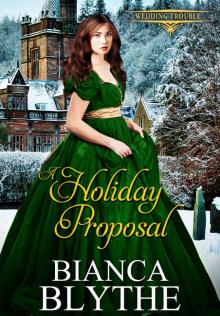 A Holiday Proposal (Wedding Trouble Book 6)
A Holiday Proposal (Wedding Trouble Book 6) The Earl's Christmas Consultant (Wedding Trouble Book 3)
The Earl's Christmas Consultant (Wedding Trouble Book 3) A Kiss for the Marquess (Wedding Trouble Book 5)
A Kiss for the Marquess (Wedding Trouble Book 5) My Favorite Duke (The Duke Hunters Club Book 2)
My Favorite Duke (The Duke Hunters Club Book 2)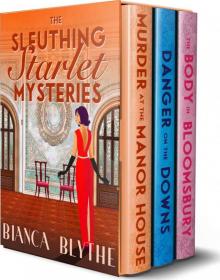 The Sleuthing Starlet Mysteries
The Sleuthing Starlet Mysteries Lords, Snow and Mistletoe
Lords, Snow and Mistletoe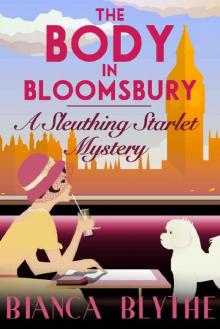 The Body in Bloomsbury
The Body in Bloomsbury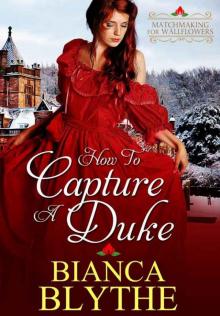 How to Capture a Duke (Matchmaking for Wallflowers Book 1)
How to Capture a Duke (Matchmaking for Wallflowers Book 1) Don't Tie the Knot
Don't Tie the Knot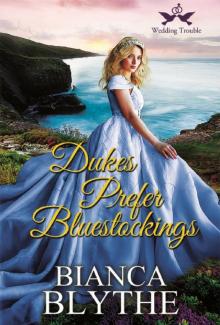 Dukes Prefer Bluestockings
Dukes Prefer Bluestockings A Marquess for Convenience (Matchmaking for Wallflowers Book 5)
A Marquess for Convenience (Matchmaking for Wallflowers Book 5) Lords, Snow and Mistletoe: A Regency Christmas Collection
Lords, Snow and Mistletoe: A Regency Christmas Collection Don't Tie the Knot (Wedding Trouble Book 1)
Don't Tie the Knot (Wedding Trouble Book 1) The Perfect Fiancé (Matchmaking for Wallflowers Book 0)
The Perfect Fiancé (Matchmaking for Wallflowers Book 0)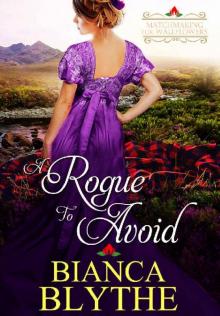 A Rogue to Avoid (Matchmaking for Wallflowers Book 2)
A Rogue to Avoid (Matchmaking for Wallflowers Book 2)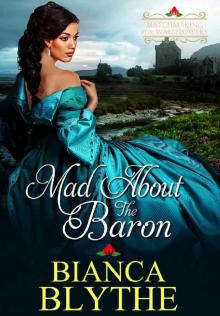 Mad About The Baron (Matchmaking for Wallflowers Book 4)
Mad About The Baron (Matchmaking for Wallflowers Book 4)